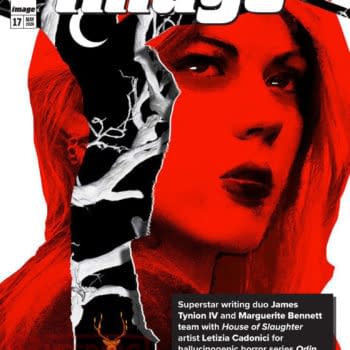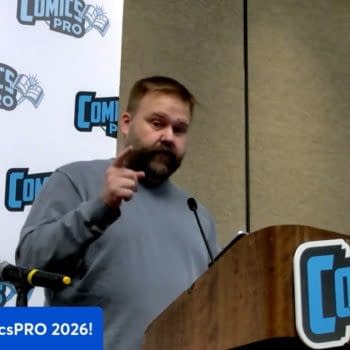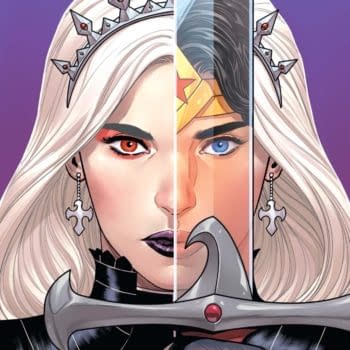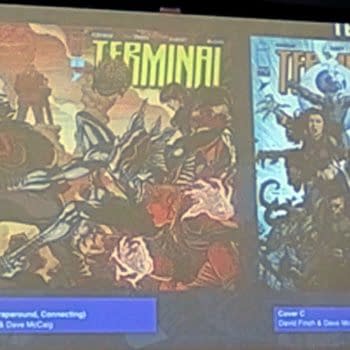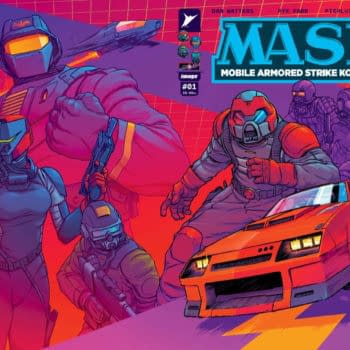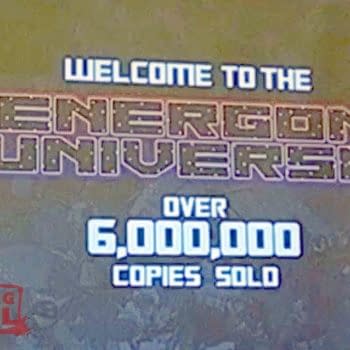Posted in: Comics, Denver Comic Con | Tagged: amanda conner, Comics, Crystal Skillman, denver comic con, Emily Singer, entertainment, Hannah Means-Shannon, Joelle Jones, Marguerite Bennett, Meghan Hetrick
Why The Women In Comics Roundtable Was About Us And Not DCC (FULL AUDIO)
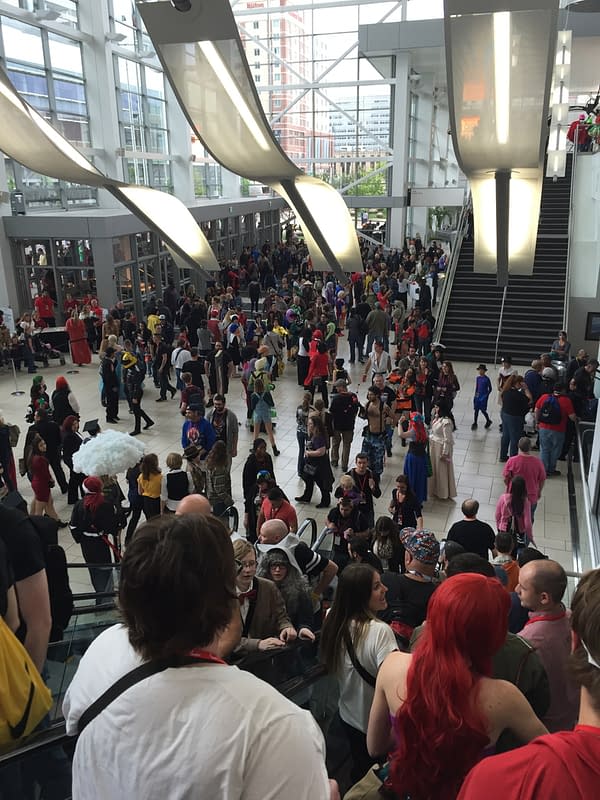
Though as a woman in the field of comics, I personally did feel my blood boil a little reading the description of what was said in the Women in Comics panel (which actually was a problem also), I am personally sickened by the fact that no one ever talks in the bigger comics sphere about Denver Comic Con's charitable foundation based on education, its independent status, or the way in which it has risen to 100,000 attendees in only 5 years. It's like the comics press wants Reed POP and Wizard World to be the only conventions in the country where there is less programming and therefore they can always get it right. Denver is a new convention that has bypassed many of the big hurdles of quick growth to reach a successful position. One of the areas they have been most engaged with is programming—with a whole slate of activities on every day of the con for cosplayers, for instance, a full slate of kids educational and hands-on activities every day and a mandate that the majority of the panels have to meet an "educative" criteria. As a former educator, I decided this year to make sure the press covered those aspects of the con, so I did 4 interviews with their programming head Bruce MacIntosh to spread the word.
But Denver overreached in their programming, clearly, because the checks weren't in place to prevent this panel from happening. If Denver Comic Con is becoming a force to be reckoned with in the geek community (and they are), this was their youthful pratfall. One panel out of 300-400 went wrong. I think we can talk about it, use it as an example, but also forgive them and stop acting like this mishap was somehow intentionally organized by Denver Comic Con. How do I know that? Because one of the con's earliest supporters, who has a great deal of influence over the tone and content of the convention, now the con's Director, is Christina Angel, a woman in comics who I have known for a few years now and it's hard to imagine meeting a professor and con organizer more passionate about diversity and "doing things right" at conventions. She's a major part of why the charity that launched the con began, and of why there is so much programming at the convention. I know that had she realized there was a Women in Comics panel at DCC with no women, her head would have nearly exploded and the panel would not have gone forward. But people who don't know Denver Comic Con, and only read about it online, don't know the personality of the con and how far from intentional this event was.

Here's what actually happened: On Sunday afternoon, playwright Crystal Skillman, who was attending DCC in Artists Valley with her husband Fred Van Lente, hearing about the Women in Comics panel issue, began talking with Trina Robbins about it, who was also attending in Artists Valley. A germ of an idea was born about somehow putting a panel together created by the women of the con, and specially geared to reach out to women attending the convention who might feel the need to talk about what had happened and also just get a due sense of representation.
By the time I saw Crystal that night at dinner, she had good reason to believe that Amanda Conner could also make the panel, and that was great news. When Crystal explained what had happened so far and asked my input, I said that we ought to get in touch with the convention organizers to attempt to secure a room and a time. We started with a time. But having seen how crowded and extremely busy the con had been, I wasn't sure in all honesty that we'd managed to get the attention of the right people in time to secure a room. We came up with back up plans to make sure the event happened, and this is what I mean by describing the event as a grassroots thing. We planned it to be held in an atrium of the convention center if we could not get a room assigned in time, and failing that, if security were unhappy with a large gathering in a central space, we were going to set it for just after the con in our nearby hotel. Something was going to happen no matter what. We were going to create a gathering.
When I woke up the next morning on Monday and started heading to the convention for a full day of meetings and hosting panels (except for the 3-4 timeslot which I made sure was open for the flashpanel if it happened then), I started getting texts from Crystal. Amazingly, the con organizers had been back in touch and we had a room. I was pleased that Denver had been able to respond so quickly to help us—it was a very meaningful gesture on their part to show that they recognized their mistakes and wanted to be part of the solution. I quickly wrote up an announcement of where and when the event was happening and posted it so that the information could be circulated right away.
Throughout the day, I learned that more guests had been added and I knew this was going to be an excellent event with plenty of discussion just based on who was attending—Amanda Conner, Trina Robbins, Joelle Jones. It was amazing what Crystal had accomplished through motivating Artists Valley and spreading the world verbally and on social media. Despite my expectations, when I walked into the room at 3 through a back entrance, coming off another panel I was hosting, I was profoundly impressed. We had a large audience, and they continued to filter in over the next hour. In fact the gathering was so large that it was a relief to have chairs and microphones to use rather than holding the Flashpanel somewhere impromptu.
Our panelists, just for a final list were, Crystal Skillman, Trina Robbins, Amanda Conner, myself (Hannah Means-Shannon), Marguerite Bennett, Meghan Hetrick, Joëlle Jones, and Emily Singer. Emily, like myself, is a journalist, and works on the Beyond the Trope podcast, but the rest I'm sure you know are comics professionals. So, having gotten all these people in one place, what did we do? We talked, and not in anger. We laughed a lot, to the point where it occurred to me that you have to have a sense of humor as a woman to survive in comics (or perhaps anyone in comics does, really).
You can listen to the audio recording of the panel, which is pretty entertaining, but some of the topics we covered were:
-Our first encounters with comics or geek culture and how that influenced our direction in life
-When and how we've felt dissonance because of gender professionally or socially in comics
-Whether the rise of female roles in film and TV has made any impact on the ability to do the same for comics
-Our concern for the next generation of women in comics and the ways in which we hope things will be different
-The lingering problems with the "you don't belong here" comic shop mentality that does not represent all retail shops
-The need for there to be so many women on comics panels as a matter of course that it no longer becomes a driving need to have "Women in Comics" panels
The panel moved quickly, at a pretty breakneck speed, and was over far too quickly, but many of the audience members came forward to chat with us and exchange stories of their experiences. On my part, I had several discussions about the need for more female pop culture journalists, and particularly in comics, so that convention life becomes more evenly skewed and there's more of a social balance, not the mention the impact this would have on the content and tone of comics journalism alone.
So, to reiterate and set the record straight, or at least straighter, while Denver Comic Con helped us find a meeting place and resources, and even provided runners to help escort convention guests from the Artists Valley floor to the proper room on time, the convention itself had nothing to do with the other arrangements of the panel or setting it up. That was down, really, to Crystal Skillman and Trina Robbins. I think it's appropriate that we celebrate their proactive efforts and the incredibly positive and successful roundtable that was held rather than treating our event as an afterthought or a publicity gesture by Denver Comic Con. This was held by us for women in comics and those concerned with women in comics, and while we were very grateful for the help from DCC, we can also be proud of what we did and thank those who took part in it with us despite short notice and busy schedules.










